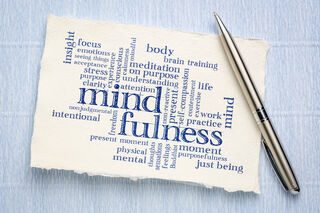ADHD
ADHD and Self-Awareness
How to improve metacognition and nurture resilience.
Posted February 3, 2022 Reviewed by Vanessa Lancaster
Key points
- Metacognition allows you to connect the dots, see the big picture, self-evaluate and self-monitor.
- Metacognition, also known as self-awareness, is a key executive functioning skill that coalesces in the late twenties for people with ADHD.
- People with ADHD typically require more time and effort to strengthen their metacognitive skills.

Do you ever struggle with evaluating how you are doing in real-time and pivoting appropriately? Metacognition, also known as self-awareness, is a key executive functioning skill that coalesces in the late twenties for people with ADHD. It refers to processes related to understanding your thinking and thought processes to improve learning and performance. It’s a way to think about your thinking.
Metacognition allows you to connect the dots, see the big picture, self-evaluate and monitor, which ultimately helps you with performance and task completion. This awareness helps improve time management, planning, focus, and other skills that frequently challenge teens and adults with ADHD. With practice and time, you can improve your ability to notice your thinking, improve problem-solving and manage the direction of your attention.
Metacognitive thinking, along with self-regulation, helps you choose, monitor, and evaluate how you approach a task, measure progress, and how close you are to achieving (or not) your final goal. It helps you transfer learning and information to different contexts and tasks by being more aware of strengths and challenges. Metacognition governs behavioral output and is tied to emotional control. It has been linked with neurobiological structures that govern memory, focused attention, and self-monitoring.
Researchers at the University College of London found that subjects with better metacognition had more grey matter in the anterior right prefrontal cortex, an area of the brain found to be smaller in folks with ADHD*. People with ADHD typically require more time and effort to strengthen their metacognitive skills. The ability for self-regulation and assessment allows you to achieve specific goals better, learn what worked well (and what didn’t), and then apply that learning to future tasks.
For example, if you are writing a report for school or work, metacognition increases your awareness of your progress, possible distractions, and the need for more efficiency so you can make different choices. If upon self-reflection, you notice it was way too noisy in the coffee shop to concentrate on your writing, you can move to a quieter space to finish your work more productively.
When your next writing project rolls around, you will already have learned that you get better results in a quiet environment. You'll skip the cafe and head straight to your bedroom or a nearby library.

The goal is to observe your abilities and improve your strategies to accomplish various tasks and projects. By assessing goals and outcomes, you’re better equipped to shift efforts and strategies. You can then develop, find, and allocate resources to optimize performance. The more experience you have in managing your thinking, the easier it’ll get.
Metacognitive processes can be applied at any point throughout the execution of a task, so you are learning and adjusting along the way:
Beforehand: Look ahead to what is in front of you: What is the goal of this assignment? Do I have what I need to work on this task? What is my first step? Second step?
During: Notice your progress: How is my plan working? Am I making progress? Do I need to make any adjustments? Where do I need help? Who will I ask for assistance? What do I know about this topic/situation/problem already that could assist me here? Where can I find the information I need?
Afterward: Consider the process as well as the accomplishment. What did I do well? What could I have done differently?
In addition to task completion, metacognitive thinking can be applied to social interactions. You create a valuable feedback loop when you practice asking yourself open-ended questions which foster self-reflection:
“How am I doing?”
“What’s helped me before that I could apply to this situation?”
“What is the impact of my words or behaviors on others?”
“What are their faces or bodies showing me?”
Another way to manage your thinking and increase self-awareness is to notice your body sensations. This process is directly related to mindfulness. Are you starting to feel anxious or tense? Is it time to shift gears to feel more relaxed?
To avoid negativity, reframe self-evaluation from good/bad to working/not working to reinforce a growth mindset and bolster resilience. It's very important that you don't use self-evaluation as a pathway for self-criticism.
For metacognitive abilities to be useful, they have to be neutral. Instead of asking, "Why can't I do this differently?" ask, "How can I do this differently, and what support do I need to make this happen?"
Metacognition improves with mindfulness. Mindfulness helps you pay more attention to what is happening around you at the moment so you can participate more fully. Instead of believing that you are your negative thoughts, you choose whether or not to accept them as true.
Rather than worry about what other people are thinking about you, you engage in present conversation and avoid the distracting rumination about their possible judgments. You may notice your self-critical thinking, but you talk back to it with attentive awareness.
This provides you with the freedom to pivot from a fixed mindset (“I am flawed, no one will like me and I can’t change.”) to a growth mindset (“I can try things, make mistakes and recover. I’m human just like everybody else.”)

Mindful awareness facilitates self-compassion too. It fosters improved self-esteem. Instead of judging yourself for what isn’t working, you treat yourself with greater understanding and notice what is going well. Imagine yourself as a ten-year-old with a skinned knee. What would you say to that child in their tough moment? Do you say this to yourself?
Practicing kindness towards yourself requires empathy, forgiveness, patience, and repetition. You make an effort, stumble, and try again–over and over. So many older teens and adults with ADHD are highly self-critical and frankly mean to themselves.
Self-compassion means asking “What can I do to help myself?” instead of “What’s wrong with me that I said that insensitive comment or I forgot to do something?” You stop fighting with yourself and start embracing and soothing yourself instead.
Metacognitive thinking, along with attentive awareness, is a powerful tool that allows you to acknowledge problems without succumbing to a failure mentality, helplessness, and low self-worth. They work together to improve efficiency in problem-solving, identify useful tools, build resilience and nurture self-reliance.
By noticing how you think about your thinking, you develop more confidence to share your strengths and live more fully.
References
Allen, Micah, et al. “Metacognitive Ability Correlates with Hippocampal and Prefrontal Microstructure.” NeuroImage, vol. 149, 2017, pp. 415–423., https://doi.org/10.1016/j.neuroimage.2017.02.008.
Fleur, Damien, Bredeweg, B. & van den Bos, W. "Metacognition: ideas and insights from neuro- and educational sciences." NPJ Science of Learning, vol. 6, no. 13, 2021. https://doi.org/10.1038/41539.2056-7936.




